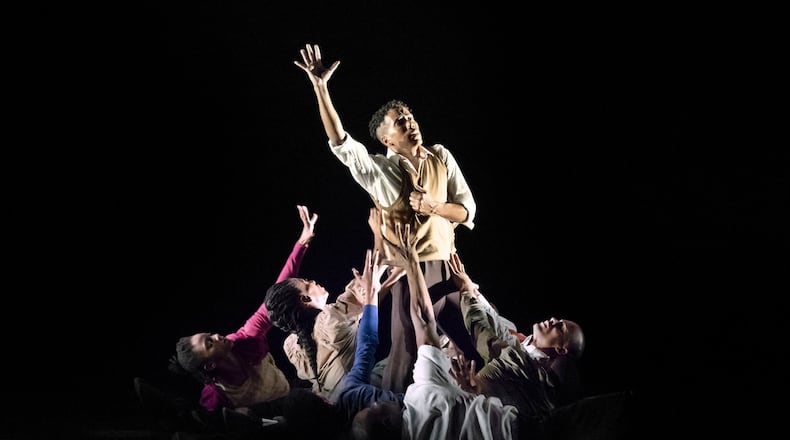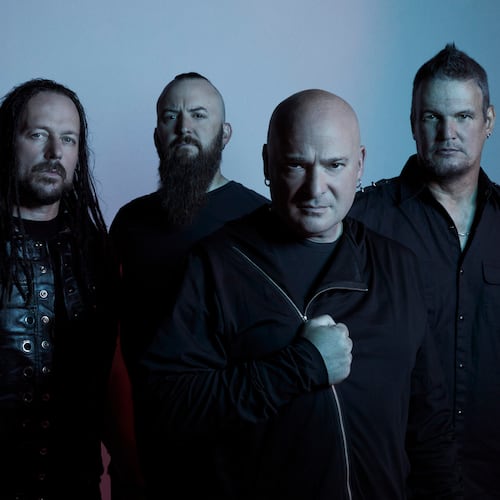It’s very telling that, even at 60, Alvin Ailey American Dance Theatre continues to break new ground. As part of its annual visit to Atlanta’s Fox Theatre, the company is presenting its first ever two-part ballet, “Lazarus,” in honor of the company’s 60th anniversary season.
Founder Alvin Ailey often referred to his modern dance works as “ballets,” but his pieces, unlike most traditional story ballets, were typically a single act. The lengthier new work, created by renowned hip-hop choreographer Rennie Harris, nonetheless feels like a natural fit for the Ailey company; it’s innovative and contemporary, but also perfectly at home within the company’s traditions.
In its two acts, the ensemble work “Lazarus” tells an abstract story of suffering and renewal. The somber first act has the dancers, dressed in drab street clothes reminiscent of the early 20th century, creating bleak stage images that bring to mind the difficult history of oppression and violence against black people in America. With heads drooping or shoulders hunched, dancers in Harris’ work masterfully paint quick, abstract tableaux of physical and spiritual exhaustion.
In its costuming, its sweeping movements and its occasional forays into gospel music, the first act of the work often seems to be in complicated dialogue with Ailey’s most famous work, “Revelations,” with which “Lazarus” shares a program. Indeed, Ailey’s voice is sometimes heard in recorded interviews in “Lazarus,” and a voice cries out for “Mr. Ailey” at the end of the piece, his shadow projected on a screen at the rear of the stage: “Lazarus” is a work that’s always conscious of the enormous legacy, of the shadow cast, by the great work of the company’s founder.
However, the suite of dances in “Revelations” ultimately tell an uplifting story of the faith, community and tenacity of African-Americans as they journeyed from slavery. Though “Lazarus” tells a parallel story of rebirth, its first act suggests the relentless interiority of individual suffering. In its central figure of a journeying pilgrim encountering figures crawling or limping across the stage, the work recalls Dante’s “Inferno,” a journey into hell. The musical soundtrack is often punctuated by the sound of heartbeats, coughing, heavy breathing, barking dogs or gunshots, giving the first act an inscrutable, nightmarish quality. In one of the work’s most memorable images, the company lies on their backs, arms raised and undulating, suggesting the waving stalks of some bitter crop.
A North Philadelphia native, Harris often brings vernacular street dance to the modern dance performance stage. It’s an aesthetic that’s a beautiful fit for the Ailey company dancers, whose sense of precision and control, of emotional connection to their bodies, is always beautifully evident in their carrying out of Harris’ movement. An action as simple as the slow lifting of a leg or even a quick running across the stage can have compelling intensity.
Credit: Paul Kolnik
Credit: Paul Kolnik
The bleak, dreamlike tone is always clear, but specific narrative references can occasionally be challengingly abstract in the work’s first act. But the piece undeniably finds its energy and heartbeat in the second act. Dressed in more contemporary street clothes, the company excels with Harris’ insanely intricate hip-hop footwork, precisely performing his moves in perfect synchronicity while also allowing the personality and individuality of each dancer to emerge. It’s a segment of the work that elicits gasps of delight and applause from the audience. One of the evening’s most exciting and crowd-pleasing moments has the ensemble dancing with rhythmic, percussive feet and hand-claps to the sounds of an up-tempo remix of Nina Simone’s classic “Feelin’ Good.”
What’s most remarkable in Harris’ work is the way his movement so often effortlessly melds opposing, seemingly incompatible forces: the refined elegance of the stage with the fierce energy of the street, fluidity with jaggedness, the communal with the individual, all blending and flowing together in inventive and original ways.
Credit: Paul Kolnik
Credit: Paul Kolnik
“Lazarus” is a story ballet in which the narrative remains decidedly abstract, but it’s a work that’s clearly engaged with and respectful of Ailey’s legacy. It’s unafraid to bring a sense of uncharacteristic, troubling ambiguity to the stage, to pose unanswerable questions in its nightmarish depiction of suffering. Some viewers may find that dense, stark sense of abstraction in the opening act off-putting, but in its rousing second act, viewers will undoubtedly connect to the work’s simultaneously cool and sophisticated depiction of resurrection, a rebirth that inevitably circles back to pay tribute to the work of Ailey himself.
Alvin Ailey American Dance Theatre performs “Lazarus” with “Revelations”
8 p.m Feb. 23 and 7:30 p.m. Feb. 24
“Members Don’t Get Weary”/“The Call, Juba”/“Revelations”
2 p.m. Feb. 23
Special program of Ailey excerpts/”Revelations”
3 p.m. Feb. 24
$29-$85. Fox Theatre, 660 Peachtree St. NE, Atlanta. 404-881-2100, foxtheatre.org.
MORE THINGS TO DO: accessAtlanta: AJC’s Things-to-do podcast
About the Author
Keep Reading
The Latest
Featured





